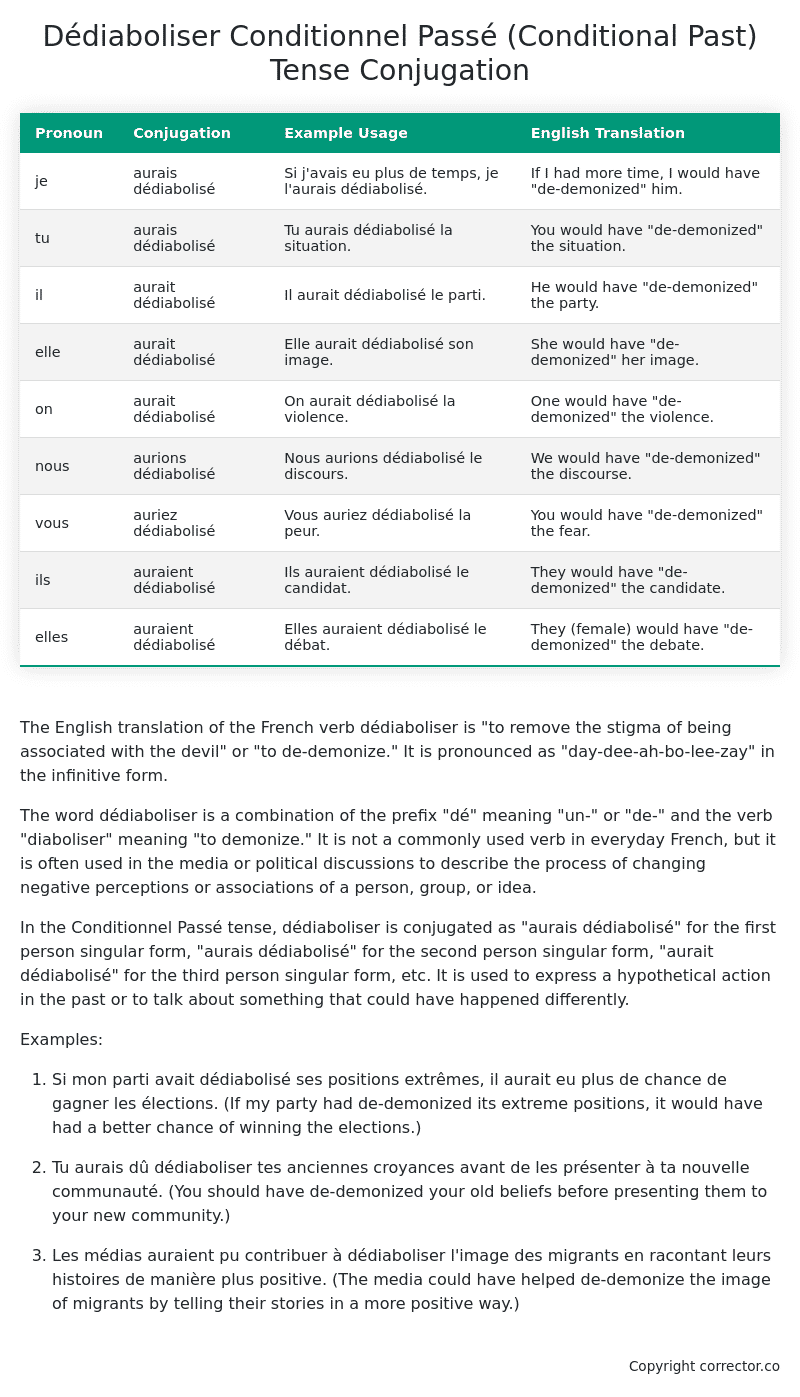Conditionnel Passé (Conditional Past) Tense Conjugation of the French Verb dédiaboliser
Introduction to the verb dédiaboliser
The English translation of the French verb dédiaboliser is “to remove the stigma of being associated with the devil” or “to de-demonize.” It is pronounced as “day-dee-ah-bo-lee-zay” in the infinitive form.
The word dédiaboliser is a combination of the prefix “dé” meaning “un-” or “de-” and the verb “diaboliser” meaning “to demonize.” It is not a commonly used verb in everyday French, but it is often used in the media or political discussions to describe the process of changing negative perceptions or associations of a person, group, or idea.
In the Conditionnel Passé tense, dédiaboliser is conjugated as “aurais dédiabolisé” for the first person singular form, “aurais dédiabolisé” for the second person singular form, “aurait dédiabolisé” for the third person singular form, etc. It is used to express a hypothetical action in the past or to talk about something that could have happened differently.
Examples:
-
Si mon parti avait dédiabolisé ses positions extrêmes, il aurait eu plus de chance de gagner les élections. (If my party had de-demonized its extreme positions, it would have had a better chance of winning the elections.)
-
Tu aurais dû dédiaboliser tes anciennes croyances avant de les présenter à ta nouvelle communauté. (You should have de-demonized your old beliefs before presenting them to your new community.)
-
Les médias auraient pu contribuer à dédiaboliser l’image des migrants en racontant leurs histoires de manière plus positive. (The media could have helped de-demonize the image of migrants by telling their stories in a more positive way.)
Table of the Conditionnel Passé (Conditional Past) Tense Conjugation of dédiaboliser
| Pronoun | Conjugation | Example Usage | English Translation |
|---|---|---|---|
| je | aurais dédiabolisé | Si j’avais eu plus de temps, je l’aurais dédiabolisé. | If I had more time, I would have “de-demonized” him. |
| tu | aurais dédiabolisé | Tu aurais dédiabolisé la situation. | You would have “de-demonized” the situation. |
| il | aurait dédiabolisé | Il aurait dédiabolisé le parti. | He would have “de-demonized” the party. |
| elle | aurait dédiabolisé | Elle aurait dédiabolisé son image. | She would have “de-demonized” her image. |
| on | aurait dédiabolisé | On aurait dédiabolisé la violence. | One would have “de-demonized” the violence. |
| nous | aurions dédiabolisé | Nous aurions dédiabolisé le discours. | We would have “de-demonized” the discourse. |
| vous | auriez dédiabolisé | Vous auriez dédiabolisé la peur. | You would have “de-demonized” the fear. |
| ils | auraient dédiabolisé | Ils auraient dédiabolisé le candidat. | They would have “de-demonized” the candidate. |
| elles | auraient dédiabolisé | Elles auraient dédiabolisé le débat. | They (female) would have “de-demonized” the debate. |
Other Conjugations for Dédiaboliser.
Le Present (Present Tense) Conjugation of the French Verb dédiaboliser
Imparfait (Imperfect) Tense Conjugation of the French Verb dédiaboliser
Passé Simple (Simple Past) Tense Conjugation of the French Verb dédiaboliser
Passé Composé (Present Perfect) Tense Conjugation of the French Verb dédiaboliser
Futur Simple (Simple Future) Tense Conjugation of the French Verb dédiaboliser
Futur Proche (Near Future) Tense Conjugation of the French Verb dédiaboliser
Plus-que-parfait (Pluperfect) Tense Conjugation of the French Verb dédiaboliser
Passé Antérieur (Past Anterior) Tense Conjugation of the French Verb dédiaboliser
Futur Antérieur (Future Anterior) Tense Conjugation of the French Verb dédiaboliser
Subjonctif Présent (Subjunctive Present) Tense Conjugation of the French Verb dédiaboliser
Subjonctif Passé (Subjunctive Past) Tense Conjugation of the French Verb dédiaboliser
Subjonctif Imparfait (Subjunctive Imperfect) Tense Conjugation of the French Verb dédiaboliser
Conditionnel Présent (Conditional Present) Tense Conjugation of the French Verb dédiaboliser
Conditionnel Passé (Conditional Past) Tense Conjugation of the French Verb dédiaboliser (this article)
L’impératif Présent (Imperative Present) Tense Conjugation of the French Verb dédiaboliser
L’infinitif Présent (Infinitive Present) Tense Conjugation of the French Verb dédiaboliser
Struggling with French verbs or the language in general? Why not use our free French Grammar Checker – no registration required!
Get a FREE Download Study Sheet of this Conjugation 🔥
Simply right click the image below, click “save image” and get your free reference for the dédiaboliser Conditionnel Passé tense conjugation!

Dédiaboliser – About the French Conditionnel Passé (Conditional Past) Tense
Formation
Common Everyday Usage Patterns
Expressing Unreal Past Scenarios
Polite Requests or Suggestions
Expressing Doubt or Uncertainty
Interactions with Other Tenses
Conditional Present
Indicative Past Tenses
Conditional Future
Summary
Want More?
I hope you enjoyed this article on the verb dédiaboliser. Still in a learning mood? Check out another TOTALLY random French verb conjugation!


